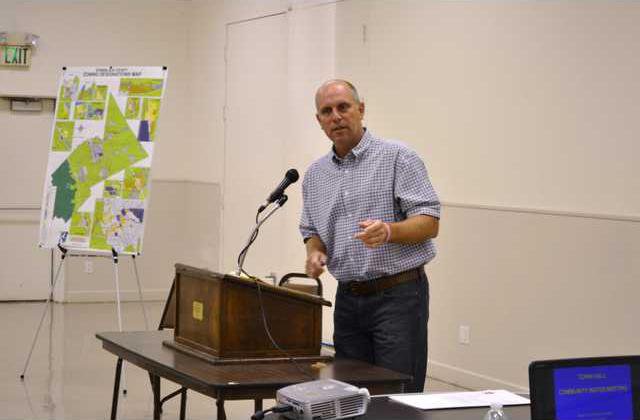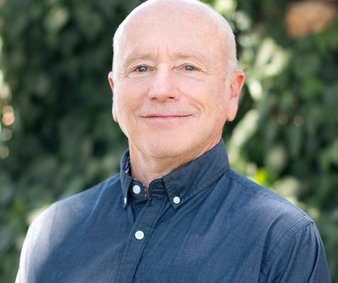The frustration shared by area residents and Stanislaus County staff was as evident as the ongoing drought on Wednesday during a community meeting hosted by the Stanislaus Water Advisory Committee in Denair.
“We’re not making any new water here and I want you to know that right off the get-go, but I want you to know what the County is doing for you,” said Supervisor Vito Chiesa to audience members.
During the meeting, Water Resources Program Manager Walt Ward addressed concerns held throughout the region, including land conversion, well interference, sustainability, and most prominently the existing multi-year drought.
“This four year drought is a drought of record,” said Ward, who noted that the snowpack during the previous drought record was at 25 percent and that the snowpack this year was at 5 percent. “We have to learn and we have to come out of this better than how we were coming in.”
“El Niño conditions do not guarantee that we are going to get rain, and more importantly that we are going to get snow,” continued Ward. “We are a snow-driven system, not a rainfall-driven. We need snowpack.”
Ward also talked about the County’s priority activities, including revising a groundwater ordinance to address sustainable groundwater extraction, focusing on groundwater database and well mapping, and complying with the Sustainable Groundwater Management Act.
“SGMA is hinging on this idea of sustainability and it gives local public agencies very broad authority to create Groundwater Sustainable Agencies, which will be responsible for putting together groundwater sustainability plans,” said Ward.
Powers held by GSAs regarding groundwater management include a 50-year planning horizon and 20-year implementation period, which includes five year reviews and updates, as well as investigating and determining the sustainable yield of a groundwater basin, collecting pertinent groundwater monitoring information, limiting groundwater extraction, imposing fees for groundwater management, and enforcing the terms of the groundwater sustainability plan.
“Everybody has got to work together,” said Ward, “because if we don’t achieve sustainability, the state will intervene.”
The state has the ability to step in if a basin is not being properly administered, which can be demonstrated by a number of factors, including no local agency willing to serve as a GSA or failing to implement the groundwater sustainability plan.
“Everyone in the Turlock basin will have to come together to come up with a groundwater sustainability plan and move forward,” said Chiesa. “This is going to be very difficult no matter how you slice it.”
Stanislaus County Assistant Executive Officer Keith Boggs provided information regarding the Emergency Domestic Well Recovery Loan Program, which was approved in August to provide assistance to county residents with dry well issues.
“This is for folks in the community who cannot afford it,” said Boggs. “They don’t have the average $16,000 it takes to drill a new well, it may as well be $1 million dollars.”
This program focuses primarily on the elderly, and it is for fixed-income residents and those who are 175 percent below the median household income for Stanislaus County, which is approximately $94,400.
Stanislaus County Fire Warden and Assistant Director of Emergency Services Dale Skiles also provided residents with information pertaining to the Temporary Water Assistance Program, which resulted from a partnership between the County and Self-Help Enterprises that was approved in July.
Through this program, Stanislaus County residents with dry wells can receive regular water deliveries while they wait for a newer or deeper well to be completed. Program costs will be funded through the California Disaster Assistance Act, which authorizes the Director of the California Governor’s Office of Emergency Services to provide funds to support essential community services and relief efforts.
“To be eligible all you have to have is a dry well, and you have to be a property owner, that’s it,” said Skiles.
Other speakers on Wednesday evening included Wayne Zipser, Stanislaus County Farm Bureau Executive Director and leader of the Stanislaus County Water Advisory Committee, Planning and Community Development Director Angela Freitas, who spoke about agricultural policies and zoning issues, and Turlock Irrigation District Board of Director Michael Frantz.
Frantz spoke about the State Water Resources Control Board’s unprecedented proposal to reallocate the water rights of the region in order to significantly increase the number of unimpaired flows on the Stanislaus, Tuolumne and Merced rivers to help fish.
“If this proposal goes through as proposed, I suspect that the 65 wells that Chief Skiles is referring to is just a canary in a coal mine,” said Frantz. “They are an indicator of what could and would come to this region if it goes through.”









